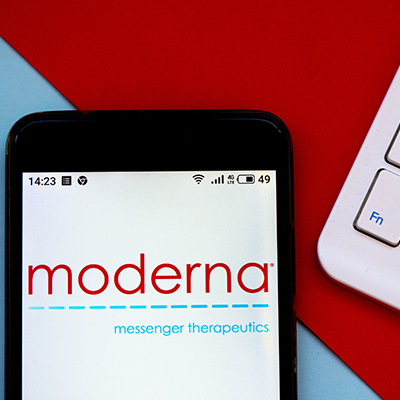December 17, 2020 -- Moderna's messenger RNA (mRNA) COVID-19 vaccine candidate, mRNA-1273, received a favorable recommendation on December 17 from an advisory committee to the U.S. Food and Drug Administration (FDA). The committee's OK means that mRNA-1273 will probably receive an emergency use authorization (EUA) within days.
The safety and efficacy of the mRNA-1273 vaccine candidate was the focus of the December 17 meeting of the Vaccines and Related Biological Products Advisory Committee (VRBPAC), which advises the FDA's Center for Biologics Evaluation and Research. This same committee signed off on the Pfizer-BioNTech BNT162b2 vaccine last week, which subsequently received an EUA two days later.
Moderna submitted its request for an EUA for mRNA-1273 on November 30. Briefing documents provided by the company prior to the meeting supported a vaccine efficacy of 94.1% and a satisfactory safety profile. Data from all three phases of clinical trials were presented in the documentation.
In the December 17 meeting, VRBPAC committee members were asked to vote on the following question:
"Based on the totality of scientific evidence available, do the benefits of the Moderna COVID-19 vaccine outweigh its risks for use in individuals 18 years of age and older?"
Based on the discussion from the previous meeting, Moderna was able to better anticipate the committee's questions and provide some additional data to facilitate meaningful conversations about the safety and effectiveness of the vaccine candidate. Namely, the company submitted preliminary data suggesting that the vaccine might protect against asymptomatic disease.
Furthermore, both the FDA and sponsor representatives addressed cases of anaphylactic reactions to mRNA-1273. Investigations into these cases were conducted rapidly. Dr. Doran Fink, PhD, FDA deputy director, explained that the surveillance systems set in place to monitor this exact situation were functioning as expected.
The VRBPAC committee spent a significant amount of time discussing how placebo participants in the trial should be treated moving forward in the clinical trial: whether they should remain blinded (unaware if they received the placebo or vaccine) or crossover (another arm of the trial where the placebo group is able to receive the vaccine). The committee was decidedly split on this topic. The ultimate decision on this question does not lie with the committee members, however, as the FDA and the sponsor will take the committee's opinions into consideration.
The VRBPAC members also expressed interest in data transparency and future data that the company will release pertaining to the question of whether the vaccine protects against asymptomatic infection. Moderna stated during the discussion that they plan to continue to collect data for this endpoint and to release data in support of a biologics license application in the future.
After deliberation, the committee voted on the potential benefits of mRNA-1273 in preventing COVID-19 in individuals 18 years of age and older. With 20 votes in favor and one abstention, the committee gave a favorable recommendation to the FDA for issuance of the EUA. Similar to the previous VRBPAC meeting, the agency is expected to make a final determination about the EUA within a number of days.
Copyright © 2020 scienceboard.net










